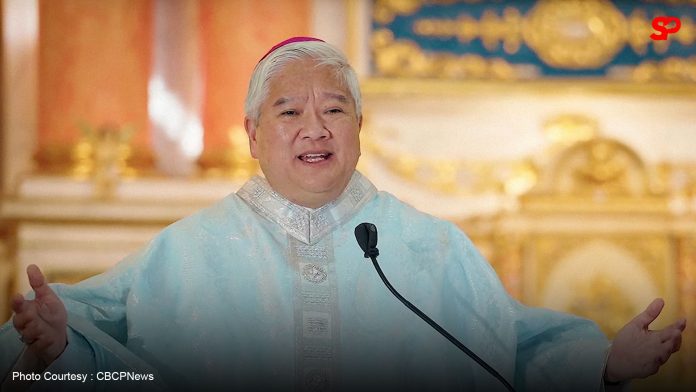By Eva Visperas
DAGUPAN CITY, Pangasinan – Archbishop Socrates Villegas of Lingayen- Dagupan has issued a strong pastoral commentary urging Filipinos to critically evaluate the 2025 national budget, highlighting concerns about its moral implications, particularly in relation to justice, public welfare, and the equitable distribution of resources.
In his statement issued on January 14, Archbishop Villegas called for greater vigilance and moral accountability, emphasizing that the national budget is not just a financial document but a reflection of the nation’s commitment to justice, particularly for the most vulnerable sectors.
“As your Archbishop, I admonish you to study diligently, judge critically and act with vigilance on the moral concern of the 2025 national budget. It is a grave social matter,” he said.
“It is better to take refuge in the Lord than to trust in princes,” the Archbishop quoted from Psalm 118:9, underscoring the need for leaders to prioritize the common good over personal or political gain.
A significant portion of the Archbishop’s criticism was directed at the Bi-Cameral Conference Committee, which he described as having overstepped its constitutional role in shaping the final version of the budget.
“Regretfully, the Bi-Cameral Conference Committee is perceived by many to have acted as a clique of interested individuals who were not representative of popular concerns and interests,” he said.
He expressed concern that this concentrated power undermines democratic processes, where the people’s elected representatives should have a more direct role in drafting a budget that reflects the true needs of the people.
The Archbishop drew on teachings from Gaudium et Spes of the Second Vatican Council, which stresses that governance must involve broad participation and consensus to achieve true justice. He warned that a budget formed by a small group of individuals does not reflect the values of a democratic society, where decisions must be made for the common good, not by a select few.
Another major issue raised by Archbishop Villegas was the lack of adequate funding for PhilHealth, the country’s health insurance system. While PhilHealth is tasked with ensuring universal health care, the 2025 budget allocation for the agency was notably absent.
“I am troubled by the fact that PhilHealth was not allocated any amount. I have sought enlightenment from those in the know on this matter, and, while it seems that those insured – who, under the concept of “universal health care” ought to include every Filipino – will still be able to enjoy the benefits this system of health insurance guarantees, still, Congress would have done well to increase both the extent as well as the coverage of benefits,” he said.
Drawing inspiration from St. Pope Paul VI’s encyclical Populorum Progressio, Villegas stressed that development must be “well-rounded” and focus on human dignity. “We cannot allow economics to be separated from human realities,” he added, pointing to the growing disparity between the country’s economic successes and the struggles faced by the poorest Filipinos.
The Archbishop also expressed concern over the allocation of funds to the Department of Public Works and Highways , which received a higher budget than the Department of Education. Despite education being constitutionally mandated to receive the highest priority, the final budget includes significant funds for infrastructure projects that critics argue are politically motivated, especially as mid-term elections approach.
“True, in the National Expenditure Program (NEP), education was assigned a higher allocation by the Executive Branch, but legislators introduced into the final form of the budget appropriations for projects which, I can only surmise, serve principally to curry favor from voters, especially as we face mid-term elections!,” Villegas pointed out.
Villegas called on lawmakers to prioritize the future of the nation’s children over short-term political gains, noting that the long-term development of a nation depends on the education of its people.
Archbishop Villegas did not spare the reduction in funding for social services, agrarian reform, and agriculture, warning that such cuts would further harm already vulnerable sectors, especially farmers. He lamented that, despite the struggles of Filipino farmers, who face economic instability due to fluctuating crop prices and the importation of cheaper goods, the government had cut deeply into agricultural funding.
Citing Centesimus Annus by St. John Paul II, the Archbishop reminded the government of its duty to intervene when monopolies and economic structures exploit the poor. “The Church cannot remain silent in the face of such injustice,” he said, urging the state to take more active steps to protect and support the nation’s farmers.
The Archbishop ended his statement with a strong moral plea to the leaders of the country: But since we are called upon to cooperate with God’s plans for the world, I call upon our leaders, in the name of God, to do what is right and just, beneficial and promising for our people.

